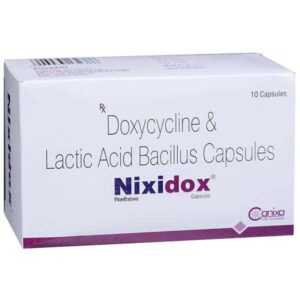DOXYCYCLINE + LACTOBACILLUS
Doxycycline: Doxycycline is a medication classified as a tetracycline antibiotic. It is commonly used to treat a variety of bacterial infections, including respiratory tract infections, urinary tract infections, sexually transmitted infections, skin infections, eye infections, and certain types of malaria.
The drug works by inhibiting the growth of bacteria by preventing them from producing proteins necessary for their survival. It does this by binding to the bacterial ribosomes and interfering with the protein synthesis process.
The dose of doxycycline can vary depending on the condition being treated and the patient’s age and weight. It is important to follow the specific instructions provided by the doctor or pharmacist. Doxycycline is typically taken orally, with or without food. It is important to drink a full glass of water and avoid lying down for at least 30 minutes after taking the medication to prevent irritation of the esophagus.
As with most medications, doxycycline can have side effects. Common side effects include stomach upset, diarrhea, nausea, and vomiting. It may also cause photosensitivity, so it is important to avoid excessive sun exposure and use sunscreen while taking this medication. Rare but serious side effects may include severe allergic reactions, liver problems, and an increased risk of certain infections such as yeast infections. It is important to seek medical attention if any severe side effects occur.
Doxycycline should not be taken during pregnancy as it may harm the unborn baby or cause permanent tooth discoloration in the infant. It should also be used cautiously in individuals with liver or kidney problems.
It is essential to complete the full course of doxycycline treatment even if symptoms improve, as stopping the medication prematurely may allow the infection to return or worsen. It is also important to note that doxycycline may interact with other medications, so it is important to inform the doctor of all current medications or medical conditions before starting treatment.
Lactobacillus: Lactobacillus is a type of bacteria commonly found in the human body, particularly in the gastrointestinal tract. It is also available as a probiotic supplement and often used for its potential health benefits.
Use:
Lactobacillus is primarily used as a probiotic to restore and maintain a healthy balance of gut bacteria. It is believed to support digestive health, boost the immune system, and improve overall well-being. It may also be used to prevent or treat certain gastrointestinal conditions, such as diarrhea, irritable bowel syndrome (IBS), and inflammatory bowel disease (IBD).
Mechanism of Action:
Lactobacillus works by colonizing the gut and producing substances that inhibit the growth of harmful bacteria. It helps maintain the balance of the gut microbiota, which is crucial for digestion, nutrient absorption, and immune function. Lactobacillus also produces lactic acid, which creates an acidic environment in the gut that inhibits the growth of pathogens.
Dose:
The recommended dosage of Lactobacillus can vary depending on the specific product and the purpose of use. It is available in various forms such as capsules, powders, or as an ingredient in fermented foods like yogurt. It is important to follow the instructions provided on the packaging or consult a healthcare professional for the appropriate dosage.
Side Effects:
Lactobacillus is considered safe for most individuals when taken in appropriate doses. However, some people may experience mild gastrointestinal symptoms such as bloating, gas, or an upset stomach. These side effects are usually temporary and subside with continued use. People with weakened immune systems, critically ill individuals, or those with a central venous catheter should use Lactobacillus with caution, as it may cause potentially serious infections. It is advisable to consult a healthcare professional before starting any new supplement, especially if you have underlying health conditions or are on other medications.
Overall, Lactobacillus is a beneficial bacteria that can support gut health and improve digestion. However, individual responses may vary, and it is important to choose the right product, follow the recommended dosage, and consult a healthcare professional if needed.


